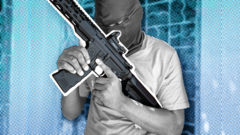An inquiry by BBC highlights a shipment of firearms from the U.S. to Haiti, showing how weak regulations and potential corruption facilitate arms trafficking that fuels gang crises. Despite heightened international awareness, the challenges remain profound, prompting calls for improved regulations and enforcement.
U.S. Arms Flow into Haiti: Unraveling the Trafficking Web Behind Gang Violence

U.S. Arms Flow into Haiti: Unraveling the Trafficking Web Behind Gang Violence
A recent investigation reveals how lax regulations and alleged corruption enable the trafficking of firearms from the U.S. to Haiti, exacerbating gang violence in the nation.
The recent seizure of weapons shipped from the United States to Haiti underscores the alarming ease with which firearms are trafficked into a nation ravaged by gang violence. A joint investigation by the BBC World Service and BBC Verify has unveiled a convoluted chain of lax laws, insufficient oversight, and purported corruption that allows traffickers to sidestep a United Nations embargo on arms.
In April 2024, Haitian authorities confiscated two cardboard boxes from a shipping container that had traveled nearly 1,200 kilometers from Florida. The shipment included 12 assault rifles, 14 pistols, and nearly 1,000 ammunition cartridges. The weapons originated from noted U.S. manufacturers, revealing a direct link between American arms sales and escalating violence in Haiti.
Haitians living in the U.S. often send vital supplies back home, including food and clothing. However, in this instance, a man renting space in a shipping container became unwittingly involved in the arms trade when a participant in the operation, who identified himself as "Diamortino," labeled the boxes as mundane items. This individual could not be reached for comment, amplifying concerns regarding the oversight in these shipping processes.
Florida has often been criticized for its permissive gun laws, particularly in how private sales could occur without stringent background checks until recent reforms instituted by President Biden. The UN panel overseeing sanctions related to Haiti implicated two Haitian brothers residing in the U.S. as having employed "straw buyers" to acquire the firearms illicitly.
The shipping operation was handled by Alliance International Shipping, which facilitates cargo transportation but claims limited ability to prevent illegal shipments. The company’s president voiced the tragedy of gun violence affecting many of their families in Haiti—an indication of the intertwined fates of the communities involved.
Questioning whether U.S. Customs and Border Protection could have intercepted the weapons beforehand, the BBC received no response, reflecting broader frustrations with the scant inspections of outgoing containers; the UN has noted that most shipments from South Florida go uninspected.
The arms ultimately found in Haiti arose amid a surge of gang activity causing widespread chaos. Recent figures reveal that violence led to 5,601 deaths in Haiti in a single year, and a humanitarian crisis ensued, with millions displaced. The gangs reportedly control around 85% of the capital, exacerbating the suffering of ordinary citizens.
The BBC’s analysis of customs data identified numerous individuals under sanctions for alleged gang affiliations in Haiti who consistently received shipments from the U.S. Although some customs operations have been improved, issues such as corruption and lack of capacity persist.
Regarding solutions, former ATF official Bill Kullman noted the absence of mandatory reporting on suspicious purchases in gun dealer compliance, calling for a voluntary code to create a culture of accountability within the industry. Experts argue that greater enforcement and potential legal reform are essential to stem the tide of weapons exacerbating Haiti's violence.
Jonathan Lowy, president of Global Action on Gun Violence, highlighted the responsibility of gun manufacturers to cease sales to illicit buyers—a step that could significantly curb trafficking methods currently readily exploited. Despite increased scrutiny from international bodies, experts lament the inaction that continues to allow this crisis to fester.
As the United States grapples with the complex issues surrounding gun laws, the plight of Haiti’s citizens underscores the grave impacts of arms trafficking—calling for immediate attention and collaborative efforts to confront the crisis and restore some semblance of stability to the island nation.






















